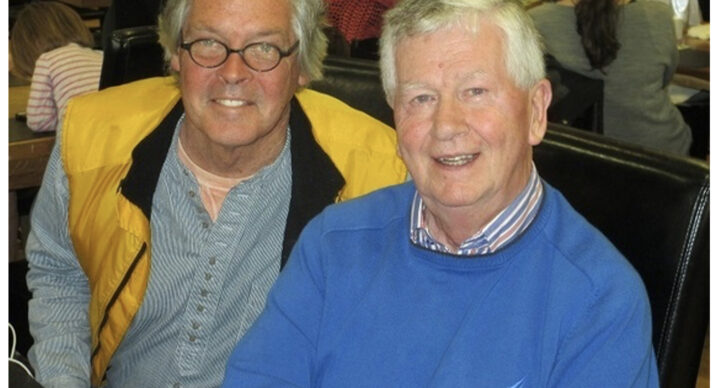“The pessimist complains about the wind; the optimist expects it to change; the realist adjusts the sails.” William Arthur Ward, noted writer/author
We all have to adjust or trim the sails of our lives at times, or we go aground.
“Experienced sailors pull and ease lines, move blocks, and tighten or loosen various controls as the boat turns and the wind shifts,” says William Porter, author and master sailor. “They’re constantly fiddling with sail controls, especially racers. But even a brand-new sailor can get out there and make the boat move somewhere.”
“Expert sailors,” he adds, “know how to get more out of their boat with good sail trim. When you trim your sails, you get them to the optimal shape to provide the most driving force for the wind conditions and point of sail. It’s a skill you can learn by understanding the basics of how the sails work.”
And so it is with Alzheimer’s and other forms of dementia—knowing how to get the most out of life’s ebbs and flows, as in sailing. Life’s hurdles as the winds of disease blow or slack, require adjustments. Surrendering to the conditions of the day should never be an option while the expert Cure Alzheimer’s Fund and others race for a cure.
As a kid, a sailing instructor taught me to “expect the unexpected.” Now, in my Alzheimer’s journey, a family disease, my long-term memory is relatively secure, at least how I remember it… But my short-term memory is pretty much a stunning blank. And so I’ve had to develop daily strategies to survive. Among other, I now write everything down on my faithful MacBook Pro laptop, my portable brain. Yet I become apoplectic when I fear I’ve misplaced my laptop without a proper backup; then, I try to catch the winds of promise.
My brain, in old school terms, was once a file cabinet, carefully arranged in categories. But now, at night, as I sleep, it’s as if someone has ransacked the files of my mind, dumping everything onto a cluttered floor. Before I get out of bed each morning, I have to gather up the “files” and arrange them in the correct order in my brain—envelopes of awareness, reality, family, work, and other elements in my life. Then it’s off to the bathroom, where, at times, I have mistaken rubbing alcohol for mouthwash (no minty taste there). And there was a time when I reached for my razor, thinking it was a toothbrush, until my long-term muscle memory shouted, “Hell NO!” It helps to mark bathroom utensils…
Then it’s off for coffee. Ah, my caffeine friend. I love coffee, practically inhale it—a habit from my old days in the Boston Herald American newsroom when I would grab cups of coffee, hot and fresh, and walk from the newsroom down to the press room and back to work out the organization and flow of a story. In my Cape Cod studio now, there’s a retro vintage red tin sign that reads: “Coffee! You can sleep when you’re dead!” But there are moments when I get confused about coffee—particularly on certain days, walking from my studio to the house with my laptop and empty coffee cup in hand. I know I’m supposed to do something with both. My brain sometimes tells me to put the laptop in the microwave and connect the cup to the printer. My spirit says otherwise: “Bad Dog!”
At 74 now, about 12 years into Alzheimer’s, a disease that experts say can take 20 years or more to run its serpentine, foggy course, I could have another eight years or so on this. Alzheimer’s and other forms of dementia are like having a sliver of your brain shaved every day. The sailing parallel, the trimming of sails, works to keep me as whole as possible.
While there are exceptions to everything in life, a person who says that a loved one died of Alzheimer’s five years after diagnosis may not fully understand that the individual likely suffered for years silently and painfully out of fear of what others might think. So, they batten down the hatches and hide the symptoms, as one often can do in the early stages.
There are weapons for an ongoing fight. Concealing symptoms in later stages is a gift called “cognitive reserve.” Harvard Health defines cognitive reserve “as your brain’s ability to improvise and find alternate ways of getting a job done. It reflects how agile your brain is in pulling in skills and capacities to solve problems and cope with challenges. Cognitive reserve is developed by a lifetime of education and curiosity.” (https://www.health.harvard.edu/mind-and-mood/what-is-cognitive-reserve)
Then there’s neuroplasticity, exercising your brain by learning new things. “Neuroplasticity is the fancy medical term used to describe your brain’s ability to learn and adapt,” notes the Cleveland Clinic. “Think of it as an internal rewiring process that allows your mind to grow and meet new and increased demands…You can build mental muscle by challenging your mind and giving it new experiences.” (https://health.clevelandclinic.org/neuroplasticity)
And then there’s a brain-enhancing program developed by Dr. Rudy Tanzi, Chair of the Cure Alzheimer’s Fund Research Leadership Group, also Co-Director of MassGeneral Institute for Neurodegenerative Disease, and a Joseph P. and Rose F. Kennedy Professor of Neurology at Harvard Medical School, among other research accolades. Dr. Tanzi’s program is called “SHIELD.” It stands for sleep, at least seven hours a night; handling stress; interacting with friends; exercising daily; learning new things; and eating a healthy diet.
(https://www.health.harvard.edu/mind-and-mood/shield-your-brain-from-decline).
Good advice for those fighting through Alzheimer’s and other dementias who look to such strategies to ply the rough seas of life rather than securing a comfortable seat on the couch where the mind drifts and drifts. One must be proactive in this fight for as long as possible, or one simply floats.
So best to be equipped to trim and adjust the sails of your life. In a piece titled “Life Lessons Learned From Sailing,” Melissa Gorchynsky, an executive director of community sailing out west, writes, “One of the first lessons in sailing is that you can’t always get from one point to the next in a direct line. If your desired endpoint is upwind, you must navigate to an alternative point for a long time before pointing back to your goal.”
In emphasizing life lessons, Gorchynsky notes:
- The Path From Point “A” to Point “B” Is Rarely Linear
- Staying calm in a Crisis Wins the Day
- It’s All About Teamwork
- The Rewards Are Worth the Risks
- Giving Up Is Easy, but the Strong Persevere
Key lessons to live by as one tries to navigate life while fighting the demons of disease. So don’t give up; there’s hope for days of clear sailing!
Grammy Award-winning singer-songwriter Christopher Cross painted an ideal word picture of seizing the right wind in life with his soft-rock hit, “Sailing”— restoring innocent child-like joy, untarnished by the hardships of life:
“It’s not far to never never land
“No reason to pretend
“And if the wind is right you can find the joy
“Of innocence again
“Oh, the canvas can do miracles
“Just you wait and see
“Believe me…”
(The views and opinions expressed in this writing are solely those of the author.)








